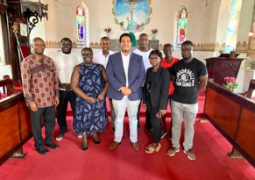The president was speaking during the State of the Nation Address held at the National Assembly in Banjul on Thursday, an event that was graced by cabinet ministers, diplomats, senior government officials and a cross-section of the community.
Over the last five years, Barrow said his government successfully expanded and developed health care services, through improved infrastructure, personnel, and supplies, on a reformed health financing landscape.
“A major achievement of my administration is the introduction of The Gambia National Health Insurance Scheme. The Act to establish the Scheme became effective in November 2021 to particularly benefit the poor and the vulnerable, while serving as a social safety net. In training, The Gambia now offers postgraduate training at the Edward Francis Small Teaching Hospital. In addition, the UTG offers health-related programmes at bachelor’s level.”
The government’s introduction of the Community Ambulance Service, following the distribution of eighty new ambulances in areas without health facilities, he said, is widely applauded in the country.
He told the parliament that there is a wide range of construction works in progress to expand services throughout the country, giving examples of the construction of a National Emergency Treatment Centre, National Laboratory Centre, and Blood Transfusion Centre in Farato.
“Development of the Civil Registration and Vital Statistics Bill (2022) is ongoing for submission to the National Assembly when finalised. It is meant to create universal access to health services.”
In Higher Education, President Barrow explained that in the area of infrastructure, his government has completed about 70% of the civil works of the University of The Gambia (UTG) Faraba Banta Campus Project, after inheriting it with less than 1% implementation status.
He added that the upgrading of the WASCAL Campus made it possible to begin doctoral programmes on Climate Change and Adaptive Land Use in-country. Annually, he said ten Gambians go to other postgraduate WASCAL Centres in the sub-region.
“Alongside programme delivery within the sector, the REPGam renewal energy Project is working to solarise twenty-three villages and train over two hundred Gambian youths in renewable energy management.”




